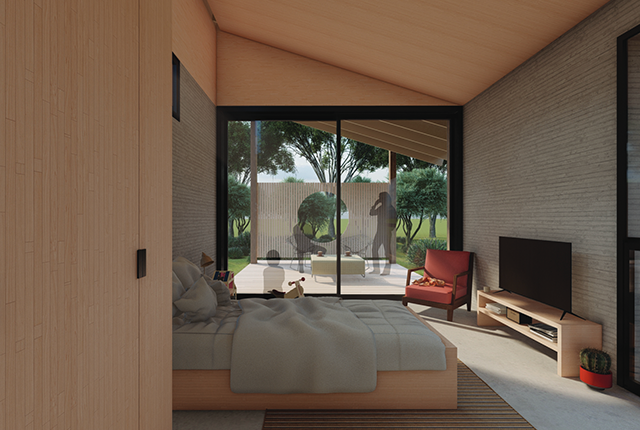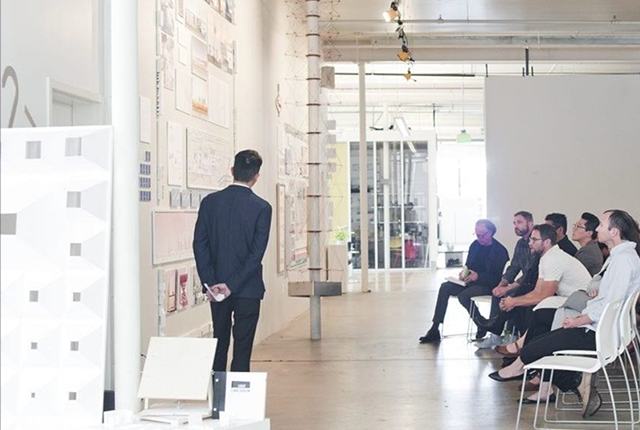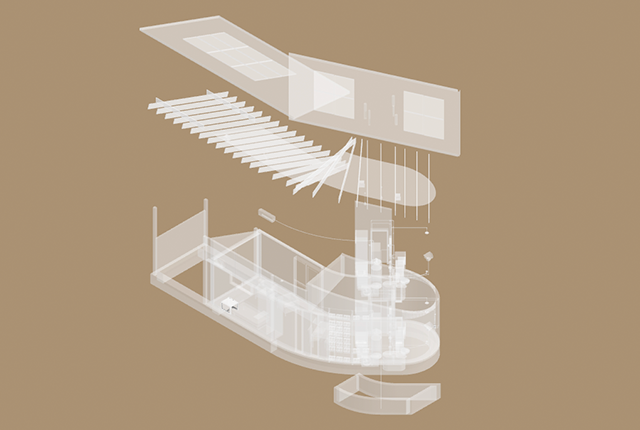School of Architecture
Construction Management
Bachelor of Science in Construction Management [STEM Program]
The mission of the Construction Management program is to transform the built environment by building sustainably. Students integrate design, technology, business analytics, and executive skills with sustainability and the liberal arts, using experiential, hands-on learning to advance as agile, future-ready leaders and entrepreneurs in the developer, construction, and design-related industries.
We are proud to share a team of Woodbury University students is a U.S. Department of Energy Build Challenge Awardee, putting to test the construction management curriculum.
Construction Management is a STEM program. Learn more about STEM at Woodbury.
Apply Request Information Take a Tour
Human-centered design principles
Apply human-centered design principles when finding solutions to industry challenges and hands-on project work.

Embrace business to cultivate change
Apply business models, ranging from organizational management to strategic thinking, to systems engineering, to sustainable construction as a means to cultivate lasting change.

Harness technology
Apply Building Information Modeling (BIM), construction technologies, and field technologies to real-world problems.
Construction Management Course Details
You can review the course requirements by clicking the button below. The adjacent drop-down menu will be populated with more information about the courses in the near future.
SUPR 1XX: Intro. to Environmental Problems and Design Units: 3
The course introduces students to the many dimensions of problem-solving in environmentally-based design. Students use fieldwork and case studies informed by interdisciplinary inquiry to examine actual sites around Los Angeles, which becomes a living laboratory. This allows students to re-envision the problems and solutions to current and future design challenges posed by climate change in the built environment. Course material emphasizes visualizing and communication of data, applying interdisciplinary, analytic tools across multiple information platforms, and collaborative problem-solving via a design studio format. Key course objectives include understanding the changing relation between humans and the environment, effectively communicating findings in a rapidly-shifting environmental design discourse, and the ability to identify and articulate design opportunities for addressing the impacts of climate change.
SUPR 1XX: Intro. to Environmental Policy and Management
This course explores how complex decision-making processes lead to the design and enactment of effective environmental policy. Students explore multiple stakeholder entities and pathways that lead to adopting environmental policy through historical, recent, international and local environmental crises. They engage case study methodology, real-world scenarios and contexts, and current policy proposals, when using environmental management tools. Students also employ current environmental policy mechanisms to debate and resolve environmental policy proposals by adopting multiple stakeholders’ perspectives, leading to writing and presenting their own policy interventions.
ENVT 230: Ecology, Earth Science, Infrastructure
This course invites students to consider and acknowledge the symbiotic relationship between the natural and built environments, and how our personal ecological footprint at the micro-level and infrastructure at the macro-level impact those environments. Course readings, movies, and field trips help students understand the delicate balance between our ecosystems and urban contexts, and the need for development to occur in more sustainable ways. Students explore responsible decision-making tactics and processes such as the use of ‘negative emissions’ as a means of ecosystem restoration, and how to leverage our own agency and advocate for change.
DCMG 1XX: Design Studio 1 – Drawing, Elements, Tools (CAD)
The course focuses on how we can reign in technology-driven elements and tools to reimagine the construction industry through a sustainability-specific lens. This studio introduces students to ‘designing with data’ where information and data are harnessed in the design and fabrication of sustainable physical spaces. Through an understanding of multiple forms and types of information that include geographical, environmental, and material logics, as well as social and economic costs, the course explores the types of tools necessary to design, represent and communicate a discrete physical space that takes on climate and social justice imperatives. The Studio comprises research, lectures, guest speakers and vendor/fabrication field visits, an introduction to industry-standard platforms (Revit, Autocad, Rhino, Bluebeam, Solidworks, adobe, etc.) as well as discussion groups as a form of evaluation and critique.
DCMG 1XX: Theory of Structures
With the built environment contributing to more than 13% of global carbon emissions during construction and a further 27% during their lifespan, what and how we build has never been more important. Through research, analysis, and proposition, the course questions both historical and contemporary building practices and asks whether a more nuanced, critical understanding of structural design and systems integration can foster the design and construction of healthier, more sustainable, and socially conscious buildings.
DCMG 2XX: Materials & Methods of Construction 1 – Sitework, Concrete, Masonry, Steel
The course examines the statics and strength of various materials and assemblies in the construction process specific to concrete, masonry and steel. Students are introduced to site work, concrete masonry and steel, and to the behavior and design of fundamental structural elements and strength of properties in the design and construction of buildings and infrastructure projects. Current trends and innovations in concrete and steel and how these innovations inform sustainability are key elements in the coursework. Learning occurs through research, analysis, discussion and presentation, and site visits to local construction sites.
DCMG 2XX: Construction Surveying and Estimating
Students explore the important role of surveying and cost estimating in the construction industry. They learn the value of geotechnical surveys in the pre-development phase and as-builts in post-construction and use optical and electronic instruments in a lab setting. Students use cost estimating software and study the concepts, procedures, and terminology in construction cost estimating, quantity take-offs of building materials, and labor and resource calculations to understand the impact cost estimation has on real-world projects.
DCMG 2XX: Construction Management and Contract Administration
How to navigate management software, contract documents, construction budgets, and cost data, construction schedules, and stakeholder management is central to the course. Students learn the precepts of sound contract negotiations and administration and employ systems thinking through the study of systems engineering. The need to manage projects holistically to avoid cost and time overruns is emphasized.
DCMG 2XX: Design Studio 2 – Computer Applications for Construction (BIM, GIS)
Students use 3-dimensional Computer-Aided Design (CAD) and Building Information Modeling (BIM) to produce
3-D building models and extracted 2-D drawings to advance their skills in Revit, Autocad, Grasshopper/Rhino, Bluebeam, Solidworks and GIS software platforms. Students understand how to manage a design and construction ecosystem, workflow design and management, and GIS mapping for whole systems design. The Studio comprises research, lectures, guest speakers and discussion groups as a form of evaluation and critique.
DCMG 2XX: Sustainable Construction
Sustainable technologies in the construction industry are explored with an emphasis on regenerative design. Students gain a deeper understanding of sustainable production processes and methodologies such as prefab/modular construction and 3D technology and the possibilities for greater efficiencies and waste reduction. Other innovations for carbon recapture, ZNE, and negative emissions as well as building codes, and industry sustainability standards such as LEED, Living Building Challenge, WELL and other sustainability standards are introduced for students to embark on their desired certification process.
DCMG 3XX: Materials & Methods of Construction 2 – Light Frame, Steel, Finishes
The course examines the construction processes specific to light-frame construction, steel, and finishes. Students gain an understanding of the properties of wood (bending, compression, elasticity, shear) and structural light framing, and light-gauge steel framing in construction projects are studied through texts, discussions, and site visits. Building finishes (textures, materials, colors, coatings) in both fixed and temporary conditions and their sustainability components such as VOCs are investigated and alternative methodologies are studied for enhanced indoor air quality.
DCMG 3XX: Energy: Mechanical Systems HVAC + Electrical Systems
This course provides an interdisciplinary approach to sustainable building strategies and green building technologies for HVAC and electrical systems. Students are grounded in the concepts of renewable energy and carbon emissions and the wider benefits of renewable energy in an integrated building system. Mechanical and electrical systems, code requirements, life cycle analysis and data driven decision making are incorporated into the coursework. Learning occurs through texts, case studies, software platforms and site visits.
DCMG 3XX: Design Studio 3 – Automation and Mechanization
The course is structured to explore architectonical and construction solutions to achieve greater efficiencies in the construction process. Students have access to the Making Complex to ideate and experiment with 3D printing technology and fabrication. They use software platforms for management processes and experiment with automating and mechanizing these processes to produce cost effective and timely project delivery. Students look to the future and consider drone technology and robotics to see how these technologies can impact the future of construction.
DCMG 3XX: Materials & Methods of Construction 3 – Experimental Fabrication & Materials
In conjunction with Studio 3, students experiment with materials and fabrication using the Making Complex and its sophisticated fabrication technologies. Focused on digital fabrication and prototyping, students explore synergies between the materials and methodologies they are experimenting with and the projects identified in Studio 3. They study sustainable material alternatives and methodologies and have the opportunity to research, design and fabricate through hands-on experimentation.
DCMG 4XX: Entrepreneurship and Management Theory
Students prepare for the future of practice and explore management strategies and the tools necessary for an entrepreneurial mindset. They are introduced to frameworks around the theories of management, business models, leadership qualities, sustainability best practices, and various business constructs important to the successful management of a project team, a small business and a large enterprise. The important role a manager plays within an organizational structure and the notion that as a potential career path one might have a practice of one’s own, is central to the course material.
DCMG 4XX: Water: Plumbing Systems + Site Systems
This course provides an interdisciplinary approach to sustainable building strategies and green building technologies for water and plumbing systems. Students are grounded in the concepts of renewable water systems such as rainwater harvesting, grey water reuse and black water recycling systems within an integrated building system of water, plumbing, and site. Code requirements, life cycle analysis, and data-driven decision-making are incorporated into the coursework. Learning occurs through texts, case studies, software platforms, and site visits.
DCMG 4XX: Construction Management Law, Ethics
The course examines legal implications of contracts, common, and regulatory law to manage construction projects. Case law and Tort law to include contracts, sales, leases, and business ethics are discussed through real world scenarios and implications. Managing risk, insurances and assurances, intellectual property and copyright, negligence and liability are core elements of the course. Ethics in relation to corporate governance, finance, discrimination, corporate social responsibility, ESG, fiduciary responsibilities, facts and disinformation are debated and discussed for robust outcomes.
DCMG 4XX: Design Studio 4 – Project-based Design/Build for the Community
The course centers on developing a project and practicing theoretical concepts and prior learnings from coursework in the previous three years. Through design, sustainability, technology, business, and interdisciplinary skills students work collaboratively to design and build a community project for the public good. Projects are located in the surrounding neighborhoods or on campus. Students are encouraged to innovate, use their entrepreneurship skills, business knowledge, and sustainability goals to design and manage the project from inception to completion, within specified cost and time parameters.
See examples of student work that embrace the ethos of the program:
Careers
Woodbury School of Architecture supports our students in building a strong foundation for professional practice while investigating the nature of practice itself. These experiences prepare students to make informed choices regarding their diverse career options. Visit our School of Architecture Career Services page for more information.
Faculty
Our faculty are architects, designers, academics and policy makers practicing in Los Angeles, San Diego and Tijuana. This internationally recognized and award-winning group works closely with students to teach the skills required to push the limits of practice.